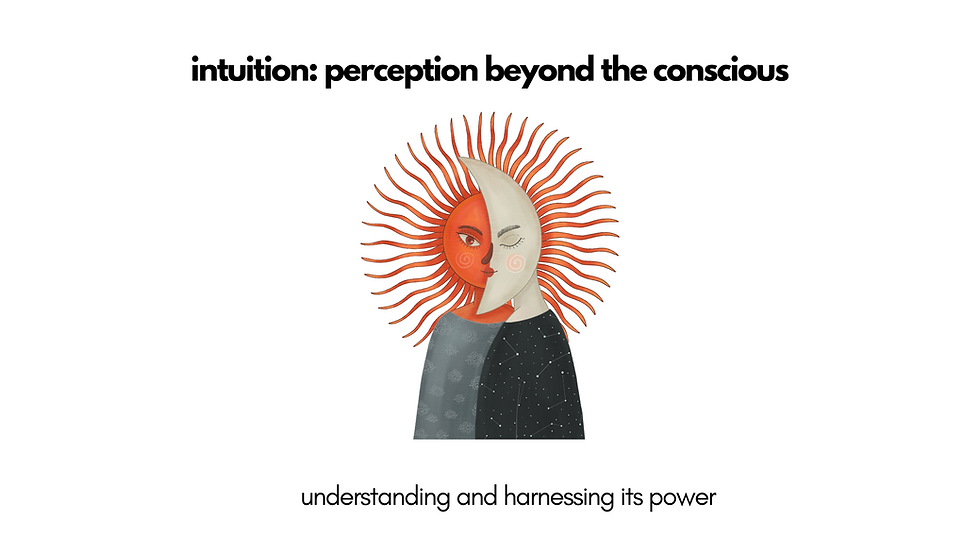intuition: perception beyond the conscious
- Laura Wenger
- Jun 10, 2022
- 4 min read

Have you ever met a new person and felt an immediate sense of unease or distrust– something about them just doesn’t feel “right”? They are saying the right things, perhaps your friends or co-workers even like this person, but there’s something inside of you that’s telling you they’re not okay.
Or maybe you’ve had the experience of listening to a friend as they tell you about their new relationship. Something about what they’re saying feels a bit “off”. They’re telling you things are fine, they’re happy, but you can’t help but feel that perhaps there’s something underneath the surface that doesn’t match what their words are saying.
Where do we feel that sense of intuition in our bodies? It might feel more like a there confusion– your “logical” brain is telling you that things are one way, but you’re not quite convinced. Or you could experience this as a “gut instinct”– sometimes, literally, a sensation in your chest or belly seems to be reacting to a situation. You may feel an inexplicable impulse to move toward or away from the person or situation. For some people, it feels like the brain is saying one thing, but the body another. For others, there’s just a feeling of not being 100% sure.
perception via the unconscious
My understanding of intuition comes from Carl Jung, who spoke of intuition as “perception via the unconscious.” He defines the unconscious as “everything of which I know, but of which I am not at the moment thinking; everything of which I was once conscious but have now forgotten; everything perceived by my senses, but not noted by my conscious mind; and everything which, involuntarily and without paying attention to it, I feel, think, remember, want, and do; all the future things that are taking shape in me and will sometime come to consciousness.”
What we call intuition is often just a deeper state of perception.
“Everything perceived by my senses, but not noted by my conscious mind.” These perceptions, or intuition, often speak to us somatically- that is, through the body. For example, as human animals, our bodies are always communicating information to each other. Some of these can be discerned, if we slow down and become more perceptive. For example, we may notice facial expressions that don’t quite match words, or an almost-imperceptible widening of the eyes or nod of the head that says “yes,” when the words say “no.” We can learn to recognize closed-off body language (crossed arms or legs, for example) or to watch where eye movements go.
In other cases, we may not be able to understand how or why we are having an intuitive thought or feeling. Perhaps something about the situation reminds us of another situation that we can’t consciously recall, but that left an impression on us. Or it may be that we’re receiving information in our bodies that our logical brain can’t process, but that creates a resonant effect. Intuition is highly individual. It can be a sensation, an image, or words. We all experience it differently.
But is it “real”?
Many of us may feel naturally skeptical about this sort of “knowing.” Our culture values facts, logic and science– all of which are important. At the very least, however, we can be open to the possibility that there are subtleties and nuance in embodied communication that our conscious mind misses, but which our unconscious mind is receiving and interpreting. We should also consider the fact that each of us has a different history and experience– as in Jung’s “everything of which I was once conscious but have now forgotten.” For example, if I’ve been in a dangerous situation before, I may be more attuned to warning signs than from someone who has not. I may not even be consciously aware of that memory, but it’s still alive in my unconscious. In this case, we can’t express how or why we’re picking up on those signals. Instead, we call them intuition.
Intuition in client work
In my experience with clients, I assume that anything the client communicates to me is important information. From the moment our session starts, clients are feeding me information about how they’re feeling, what they need from our time together, their mood, their relationship with me and with the world. I treat all this information as though it’s something they want me to know, even if they weren’t sure they consciously wanted to tell me, or if they seem confused about it.
For example, they may casually mention something they’re dealing with in their personal life. On the surface, it might not seem relevant to their practice with me, but I understand it as something that’s affecting them in some way. I’m always especially interested when someone says, “I’m not sure why I’m telling you this,” because it signals a subconscious need to share something with me that their conscious mind doesn’t quite understand.
I’m also informed by things like their posture or gait; how they take off their shoes, or sigh as they come in the door. Are they looking at their phone, or fussing with their clothes? All of these can be unconscious ways of communicating. Of course, I can choose how to respond (or whether to respond at all), but I don’t disregard this information– it’s an important part of working together.
Yesterday, a client said, “You always seem to know just what I need!” I responded, “You knew what you needed when you came in the door. I just listened to what your body and spirit were saying.”



Comments